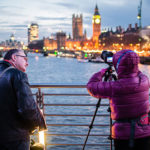Photography is all about capturing the best moments possible and trying to make them last forever. But what happens when the photo is old, tattered, or ruined by something like water? Worry no more! There are ways to preserve and bring that photo back to life. Aaron Nace shows you how in this video tutorial:
To start, you will need the following:
- A scanned image of the photo (or all of the pieces of the photo)
- Photoshop CS4 or above
- Patience!
If Your Photo is in Different Pieces
1. Make sure that you’ve scanned all the pieces and they are together in one image. When you’ve opened this image in Photoshop, you then want to put the torn pieces back together. “But how?” you may ask. Simple!
2. Outline each piece using the magic wand tool. If your image pieces are on a white background, this should be simple for you.
3. Right click on one piece at a time and create a new layer by cutting and then pasting as new layer. When you have all of your pieces on individual layers, this is where the fun comes in!

4. Click on each layer and drag the piece to its destination. Make sure you pay attention to detail and line everything up perfectly or your finished product may look a bit weird.
Once you have finished dragging the pieces to their respective locations in this personal jigsaw puzzle, it’s time to restore the rest of the image!
Restoring the Image
We want to fix the coloring problems on your photo as well as any blemishes known as tears, rips, stains, etc.
Before anything else, clean up your image. You can choose to either merge all the pieces so it looks as if it’s one photo already, or you can choose to edit each section on a separate layer.
Fixing Blemishes
Take your spot healing brush tool and go over any small stains that don’t have a mess around them. In the video above, this would be something simple like a stain on the shirt, the wall, or something else that has a plain background. Once you have spot healed them, the blemishes will disappear.
The spot healing brush is the best to start off with because it samples other parts of your image to cover the part you’re painting over. There is no re-sampling, and it’s a great way to clean up the image. If your photo isn’t too tattered and stained, this may be one of the only tools that you use.
If you’re trying to repair someone’s skin or face, the clone stamp tool is the better tool of the two to use. The spot-healing tool takes samples from places that don’t necessarily replicate the color or texture of your subject’s skin, whereas the clone stamp tool samples from the place of your choosing.
On a new layer, select your clone stamp tool and click on a clean area that you want to replicate somewhere else. For instance, if there is a part of the skin on the photo that isn’t ruined, click on that piece for the sample. When you have done that, paint over the stains on the face to create a new layer of beautiful skin. Continue doing this until your subject’s skin, background, and clothes are pretty much clean.
Discoloration
If your photo is older or has any discoloration at all, this next quick step is great for beginners to put a bit of life back into their photos. Click on anew adjustment layer and scroll down all the way to the bottom until you see “selective color.” If your photo is more yellow, go to the yellow section under your “selective color” area and tone it down a bit. If there is an abundance of darks, lights, or any other colors, you can go to their respective color selection slider and alter them on this layer.
When you’re happy with what you’ve done, merge all of the layers, save the photo, and you’re done.
That’s it! If you’re a beginner, it may take some time to restore photos depending on the difficulty, but start out with something that doesn’t need to be pieced back together and something that isn’t one big stain. Once you’ve mastered an easier photo, you’re ready to start saving bigger memories!
Like This Article?
Don't Miss The Next One!
Join over 100,000 photographers of all experience levels who receive our free photography tips and articles to stay current:








Reconstruction and restoration of damaged photos was a much more demanding task when we had no computers and digital cameras.
Isn’t science and technology wonderful?
Don